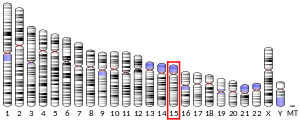ABHD2
Abhydrolase domain-containing protein 2 is a serine hydrolase enzyme that is strongly expressed in human spermatozoa. It is a key controller of sperm hyperactivation, which is a necessary step in allowing sperm to fertilize an egg.[5] It is encoded by the ABHD2 gene.[6]
Function
In the presence of Progesterone (or Pregnenolone Sulfate[7],) it cleaves 2-arachidonoylglycerol (2AG) into glycerol and arachidonic acid (AA).[8] 2AG inhibits sperm calcium channel CatSper, and so when ABHD2 removes 2AG calcium flows into the cell through the CatSper channel, leading to hyperactivation.[8]
ABHD2 is inhibited by testosterone, (as well as hydrocortisone, and the plant triterpenoids lupeol and pristimerin) which may prevent premature hyperactivation.[7]
Structure
This gene encodes a protein containing an alpha/beta hydrolase fold, which is a catalytic domain found in a very wide range of enzymes. Alternative splicing of this gene results in two transcript variants encoding the same protein.[6]
Role in disease
The ABHD2 gene is down regulated in the lungs of people with Emphysema. Analysis of ABHD2 deficiency in mice found a decrease in phosphatidylcholine levels. The mice developed emphysema which was attributed to an increase in macrophage infiltration, increased inflammatory cytokine levels, an imbalance of protease/anti-protease, and an increase in cell death. This research suggests that ABHD2 is important in maintaining the structural integrity of the lungs, and that disruption of phospholipid metabolism in the alveoli may lead to the development of emphysema.[9] Increased expression has also been seen in the lungs of smokers.[10]
ABHD2 is also expressed in atherosclerotic lesions. Expression has been found to be higher in patients with unstable angina than in patients with stable angina.[11]
Up-regulation of ABHD2 has been observed in cells transfected with Hepatitis B virus (HBV) DNA (HepG2.2.15 cells). Expression was down-regulated by the drug lamivudine, used in the treatment of hepatitis B. It has been suggested that ABHD2 has an important role in HBV propagation and could be a potential drug target in the treatment of hepatitis B.[12]
References
- ^ a b c GRCh38: Ensembl release 89: ENSG00000140526 – Ensembl, May 2017
- ^ a b c GRCm38: Ensembl release 89: ENSMUSG00000039202 – Ensembl, May 2017
- ^ "Human PubMed Reference:". National Center for Biotechnology Information, U.S. National Library of Medicine.
- ^ "Mouse PubMed Reference:". National Center for Biotechnology Information, U.S. National Library of Medicine.
- ^ "Preventing sperm's 'power kick' could be key to unisex contraceptive". Berkeley News. 2016-03-17. Retrieved 2017-09-13.
- ^ a b "Entrez Gene: ABHD2 abhydrolase domain containing 2".
- ^ a b Mannowetz, Nadja; Miller, Melissa R.; Lishko, Polina V. (2017-05-30). "Regulation of the sperm calcium channel CatSper by endogenous steroids and plant triterpenoids". Proceedings of the National Academy of Sciences. 114 (22): 5743–5748. doi:10.1073/pnas.1700367114. ISSN 0027-8424. PMC 5465908. PMID 28507119.
- ^ a b Miller, Melissa R.; Mannowetz, Nadja; Iavarone, Anthony T.; Safavi, Rojin; Gracheva, Elena O.; Smith, James F.; Hill, Rose Z.; Bautista, Diana M.; Kirichok, Yuriy (2016-04-29). "Unconventional endocannabinoid signaling governs sperm activation via the sex hormone progesterone". Science. 352 (6285): 555–559. doi:10.1126/science.aad6887. ISSN 0036-8075. PMC 5373689. PMID 26989199.
- ^ Jin S, Zhao G, Li Z, Nishimoto Y, Isohama Y, Shen J, Ito T, Takeya M, Araki K, He P, Yamamura K (Mar 2009). "Age-related pulmonary emphysema in mice lacking alpha/beta hydrolase domain containing 2 gene". Biochemical and Biophysical Research Communications. 380 (2): 419–24. doi:10.1016/j.bbrc.2009.01.098. PMID 19250629.
- ^ Shahdoust M; et al. (2013). "Finding genes discriminating smokers from non-smokers by applying a growing self-organizing clustering method to large airway epithelium cell microarray data". Asian Pac J Cancer Prev. 14 (1): 111–6. doi:10.7314/apjcp.2013.14.1.111. PMID 23534707.
- ^ Miyata K, Nakayama M, Mizuta S, Hokimoto S, Sugamura K, Oshima S, Oike Y, Sugiyama S, Ogawa H, Yamamura K (Jan 2008). "Elevated mature macrophage expression of human ABHD2 gene in vulnerable plaque". Biochemical and Biophysical Research Communications. 365 (2): 207–13. doi:10.1016/j.bbrc.2007.10.127. PMID 17980156.
- ^ Ding X, Yang J, Wang S (Mar–Apr 2011). "Antisense oligonucleotides targeting abhydrolase domain containing 2 block human hepatitis B virus propagation". Oligonucleotides. 21 (2): 77–84. doi:10.1089/oli.2011.0280. PMID 21466387.
External links
- Human ABHD2 genome location and ABHD2 gene details page in the UCSC Genome Browser.
Further reading
- Miyata K, Nakayama M, Mizuta S, Hokimoto S, Sugamura K, Oshima S, Oike Y, Sugiyama S, Ogawa H, Yamamura K (Jan 2008). "Elevated mature macrophage expression of human ABHD2 gene in vulnerable plaque". Biochemical and Biophysical Research Communications. 365 (2): 207–213. doi:10.1016/j.bbrc.2007.10.127. PMID 17980156.
- Kimura K, Wakamatsu A, Suzuki Y, Ota T, Nishikawa T, Yamashita R, Yamamoto J, Sekine M, Tsuritani K, Wakaguri H, Ishii S, Sugiyama T, Saito K, Isono Y, Irie R, Kushida N, Yoneyama T, Otsuka R, Kanda K, Yokoi T, Kondo H, Wagatsuma M, Murakawa K, Ishida S, Ishibashi T, Takahashi-Fujii A, Tanase T, Nagai K, Kikuchi H, Nakai K, Isogai T, Sugano S (Jan 2006). "Diversification of transcriptional modulation: large-scale identification and characterization of putative alternative promoters of human genes". Genome Research. 16 (1): 55–65. doi:10.1101/gr.4039406. PMC 1356129. PMID 16344560.
- Edgar AJ, Polak JM (Apr 2002). "Cloning and tissue distribution of three murine alpha/beta hydrolase fold protein cDNAs". Biochemical and Biophysical Research Communications. 292 (3): 617–625. doi:10.1006/bbrc.2002.6692. PMID 11922611.
- Suzuki Y, Yoshitomo-Nakagawa K, Maruyama K, Suyama A, Sugano S (Oct 1997). "Construction and characterization of a full length-enriched and a 5'-end-enriched cDNA library". Gene. 200 (1–2): 149–156. doi:10.1016/S0378-1119(97)00411-3. PMID 9373149.
- Maruyama K, Sugano S (Jan 1994). "Oligo-capping: a simple method to replace the cap structure of eukaryotic mRNAs with oligoribonucleotides". Gene. 138 (1–2): 171–174. doi:10.1016/0378-1119(94)90802-8. PMID 8125298.
- Rapiejko PJ, George ST, Malbon CC (Sep 1988). "Primary structure of a human protein which bears structural similarities to members of the rhodopsin/beta-adrenergic receptor family". Nucleic Acids Research. 16 (17): 8721–8721. doi:10.1093/nar/16.17.8721. PMC 338599. PMID 2843827.





